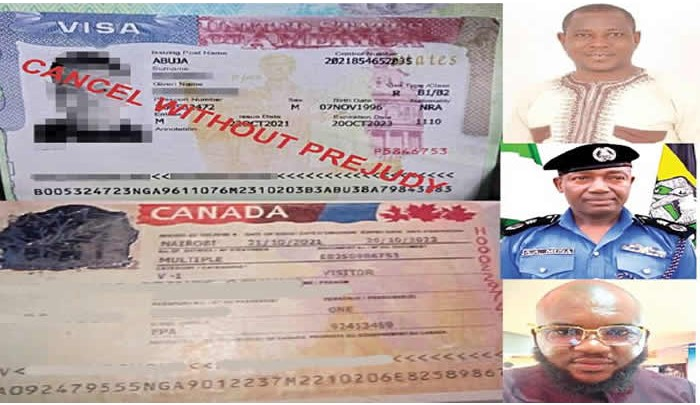Japa: How desperate Nigerians reap losses after patronising fake visa syndicates

The desperation by some Nigerians to enter some countries that have strict visa regime has led some of them to procure fake visa, Olaide Oyelude, James Abraham, Chima Azubuike and Chika Otuchikere examine the experiences of these persons, the money lost and the lessons learnt.
Smarting from the pain of the financial loss she suffered in her frantic bid to secure a visa to relocate to Qatar for greener pastures, Hadjia Ibrahim (Not real name) admitted, rather sadly, that she had yet to forgive herself for such desperation in the recent past.
A nurse with career prospects at the Federal Teaching Hospital, Katsina, Katsina State, Ibrahim said she almost resigned from her job to jump at the fake visa a syndicate arranged for her to journey to the beautiful country.
But beyond the delays and dashed hopes that eventually hit her, she said she lost about N600,000 to the fraudsters who promised to facilitate the trip before reality dawned on her and she aborted the plan.
She narrated her ordeal to one of our correspondents, “Some of our colleagues sold the idea of the trip to me and they actually introduced me to a syndicate in Kano. The people encouraged me to get a passport and other travelling documents. Of course, I obtained those documents with their assistance. Then, the waiting game began, followed by a series of extortion.
“They (the syndicate) would collect N20,000 today, N50,000 tomorrow, and at other times, N100,000. That was how they were collecting money from me with repeated assurances. At a point, I was even asked to bring my luggage to Kano preparatory to our take-off, ‘anytime’, but it was all a ruse. They told me they would help me to secure a job once I got to Qatar and that they would be responsible for my flight ticket.
“The luck I have, which remains my saving grace, was that when I travelled to Kano, hoping to leave the country from there, I did not drop my resignation letter at work. I only requested casual leave. That was what saved me; else I would be jobless by now.”
Interestingly, she said it was when she met other victims in Kano, who also shared their experiences, that she realised that they had been scammed.
“It dawned on me that the syndicate was just fleecing us and feeding fat on us. I stopped answering their calls and I threatened to arrest the two men claiming to be their agents when they approached me and were telling me all sorts of lies.”
For anyone who thinks Ibrahim’s case is pathetic, Gloria John’s experience is probably worse.
A primary school teacher in Jos, Plateau State, whose invitation to the United Kingdom at the behest of her daughter was equally ruined by visa scammers, who seem to be expanding their trade in the northern part of the country.
Narrating her plight to Sunday PUNCH, John revealed that her daughter, who was delivered of a baby in London, invited her to help care for the baby, but she fell into the wrong hands, which made her lose money and the trip altogether.
She continued, “What I went through while trying to acquire a visa to the United Kingdom left me devastated. I wanted to go for Omugwo (postpartum care for the mother and child), so I went to their High Commission in Abuja after getting an interview date.
“I was made to go from one office to another alongside other visa seekers. They called our names and I even did thumb-printing, but there was no formal oral interview in the true sense of the word.
“After the exercise, somebody approached me on my way out of their office and offered to assist me in procuring the visa faster. He told me I wouldn’t be able to get it without assistance and that he had been helping people in need of a visa. I told him I didn’t have money, but he said I could pay when the visa was out successfully.”
To John, that sounded “sensible and reasonable”, thus, they reached an agreement of N150,000 and that she wouldn’t need to pay anything until the visa was ready.
She said to her amazement, about a week after, he called that the visa was ready and that he was bringing it to her in Jos, the Plateau State capital. Her excitement is easily imagined, even though it turned out to be short-lived.
“I was excited when he gave me the documents indicating that it was a success,” she said. “Out of excitement, I quickly sourced for his money and he left after collecting the agreed fee. However, I was surprised when a dispatch rider brought another message from the UK High Commission a few days later, which indicated that my visa application was unsuccessful.
“The one from the dispatch rider, which was delivered to the address we supplied during the visa application, turned out to be the authentic one. And that was how I realised I had been scammed. I lost money just like that, and that also ended my plans to travel to the UK to see my grandchild and assist my daughter. I can’t believe I was that gullible.”
Japa, a national challenge
Over the years, emigration by Nigerians has continued to be on the increase, due largely to hardship, high unemployment rate, insecurity, rising cost of living against dwindling disposable income, falling standard of education and what some refer to as the country’s bleak future. The myriad challenges have been blamed on poor leadership, corruption and dishonest ruling class more disposed to self enrichment than national interest.
Meanwhile, the strict visa regime in most of the developed countries Nigerians aspire to travel or relocate to has made it impossible for many Nigerians planning to relocate, a situation that has led some to take illegal routes or embrace fraudulent means to obtain visas.
For example, a report, titled ‘Shorelight’, by the Presidents’ Alliance on Higher Education and Immigration in August indicated that the United States denied 71 per cent of students in Nigeria and other West African countries visas in 2022.
In fact, according to the alliance of American college and university leaders, data from MPOWER revealed that out of the 3,000 students from Sub-Saharan Africa admitted for graduate studies to a top US university in 2022, only about 60 per cent were granted a student visa despite being admitted and having secured the required funding.
The alliance argued that the high visa denial rates had reportedly resulted in African students falling victim to con schemes by fraudulent actors who offer false guarantees for securing a visa.
While visa denial does not justify crime, it, arguably, underscores the rate at which people, students and professionals inclusive, were desperate to leave the country.
The spate of brain drain in the country is now popularly known as Japa.
Further investigations showed that while many have become victims, the syndicates of fake visa merchants may have succeeded in facilitating the trips of some travellers, especially some persons from Zango, Baure and Sandamu in Katsina State, to Saudi Arabia and other Middle East countries.
Meanwhile, many of their victims have been left in worse financial situations, in addition to the dashed hopes, even as many have yet to come out of the psychological trauma.
For example, Habibatu Samaila (not real name), until her sojourn outside the country, was a popular rice merchant at the Central Market, Katsina.
Her business was doing well until the Covid-19 pandemic in 2020. Her friends, who seemed concerned about her failing business, counselled her to relocate abroad and take up menial jobs to raise money to either start again or start another business.
It was learnt that in 2021, some friends introduced her to a syndicate that procures visas and facilitates people’s travel plans. As advertised, the group assisted her to travel to the Kingdom of Saudi Arabia, but without the knowledge and consent of her husband.
There, it was learnt, she was engaged as a housekeeper and nanny.
Meanwhile, last July, her son, who was in SS2, was ‘arrested’ allegedly at the instance of the syndicate.
An agent working for the syndicate had allegedly told the boy at one of the outposts of the Nigeria Security and Civil Defence Corps that her mother listed him as her surety and since the woman had reportedly absconded from Saudi Arabia, he had to be arrested to recover the loans the syndicate advanced his mother for the trip and for her to settle down in Saudi Arabia.
The boy told our correspondent that it was at the outpost that he got to know that his mother travelled to Saudi Arabia and not her hometown, as she told them.
The frightened lad only agreed to speak after assurances of his safety and anonymity. He preferred to be identified as Ahmad.
He told Sunday PUNCH, “I am 17 years old and in SS2. I was arrested in July by some people who came with two NSCDC officials. On getting to their office, they showed me an agreement signed by my mother where she put my name as a surety. My passport photograph was also attached to the agreement.
“It was from the agreement that I knew that my mother had travelled to Saudi Arabia and that some people sponsored her trip after agreeing with them that they would collect whatever she earned as salary for three years. I also learnt at the outpost that my mother had absconded from the place the people (syndicate) got her a job and that her whereabouts were unknown.
“It took the intervention of my father and his lawyer to get me released the second day.”
It was also learnt that Samaila spent close to N750,000 before she was able to make the trip, and that the money was spent to obtain a visa and other documents, including her passport.
It was also learnt that the group paid her airfare and assisted her to get the menial job and temporary accommodation in Saudi Arabia.
One of our correspondents gathered that the bond signed by Samaila indicated that an agent working for the syndicate would collect her salary for three years, after which she would be free to look for another job and collect her salary by herself.
However, she was said to have absconded from her workplace early this year, leading to the arrest of her son, when efforts to locate her proved abortive.
The Public Relations Officer of the NSCDC in Katsina State, Buhari Hamisu, denied the involvement of the corps in the case, insisting that “no case of such was reported at any of our outposts or divisions.”
Meanwhile, our correspondents learnt that the syndicates operate across states using agents.
When contacted over the rising visa scam in the northern region, the spokesperson for the Katsina State police command, ASP Aliyu Abubakar, disclosed that two cases had been reported to the command.
He stated, “Two cases of obtaining money from victims without facilitating their trips abroad were reported this year and are still under investigation. The victims are women.”
Getting official comments from the state was unsuccessful as officials in the Ministry of Internal Security and Ministry of Women Affairs said they were not aware of such cases.
But, one of the officials said, “Such cases are personal and private. You only hear when it backfires. Our ministries have no official record or formal report of such.”
In the first quarter of this year, the Lagos Police Special Fraud Unit arraigned a travel agent, Abioye Abolaji, for allegedly forging the United Nations invitation letters for no fewer than 77 visa applicants in the state, supposedly to enable them travel for UN conferences.
The spokesperson for the unit, Eyitayo Johnson, while arraigning the suspect said, Abolaji was arraigned on 11 counts bordering on alleged forgery, obtaining money by false pretence, false representation and stealing.
He said, “The arrest of the suspect was in furtherance of a petition from the Diplomatic Security Services Regional Security office at the United States Consulate General, Lagos, which requested discrete investigation into forged documents submitted by certain C-2 visa applicants to the Non-Immigrant Visa Unit of the USCG. The C-2 visa is an NIV category reserved for participants at United Nations conferences/events.
He said, “An investigation by the USCG and the PSFU into 77 C-2 applications from 24 organisations in Nigeria to attend two separate conferences, including the 67th session of the UN Commission, on the status of women and the UN 2023 Water Conference scheduled to take place in New York between March 22 and 24, 2023, revealed that most of the applicants are not qualified for the visa classification they applied for because the applicants provided forged UN invitation letters.
“The police investigation and interviews of the applicants led to the arrest of Abolaji, who was described as the arrowhead of a notorious syndicate that specialised in visa fraud. The Commissioner of Police, PSFU, Adepoju Ilori, consequently advised prospective visa applicants to desist from patronising document or visa vendors.”
Regrettably, in spite of warnings, many Nigerians have fallen victim to such practices.
Not even 40-year-old Thomas Akpata from Nasarawa State was deterred by the counsel.
Akpata, a staff of a private company in Lafia, the state capital, earned good remuneration alongside other entitlements, “but greed and the zeal to make it bigger, coupled with wrong counsel from my close friends to pursue greener pastures abroad, led to my experience,” he said with a note of regret.
He said he was told that the grass could be greener abroad, and that after perfecting his travel documents within a short time, he resigned from his job to relocate to a European country.
He disclosed that from the money he got as severance pay from the company, he bought a car for his wife and spent the remaining to process his visa and other documents.
Akpata added, “Someone told me to go overseas, Europe specifically, that there was money there. I had to quit my job where I was making enough money to fend for my wife and three children.
“I used the remaining money I collected from my company as ‘entitlement’ after resignation to process my visa and other travel documents. The man processing it showed me nice pictures on the phone. So, I believed the deal was genuine, only to realise that I was deceived with fake travel documents that included fake invitation and appointment letters.”
The father of three who today regrets his action said it soon dawned on him that he had been scammed when immigration personnel started harassing him on a regular basis until he was subsequently deported.
“My stay was a very short-lived one. I had no option but to give up after wasting my money and time there. I realised that I had been swindled because there was nowhere to sleep or work as promised by the travel agency.
“When I returned, it was like starting afresh; no job, no money. I became a taxi driver. I had to collect the car I bought for my wife. It was the only way to support the family.”
Now an advocate of legitimate relocation, Akpata cautioned, “Those of you attempting to travel must be sure of what you are getting involved in. There is nothing like greener pastures. You must carefully make your choice in order not to regret the choices of today.”
Sunday PUNCH investigation revealed that desperation to leave the country and the stringent conditions for Nigerians to obtain a visa lured many victims into the crime.
For example, to obtain visa to some countries, applicants are mandated to produce letter of invitation from someone living abroad, current bank statement for the last six months, letter of employment, leave permission from an employer, income tax certificate, copy of company registration (for entrepreneurs), company bank statement for the last six months as well as proof of accommodation, the host’s bank statement, and their utility bills. Some also demand primary and secondary school certificates.
Sadly, the menace of fake visas has become a nationwide crime, fuelled by the desperation of many, especially the youths, to leave the country for greener pastures abroad.
In Abuja, the Federal Capital Territory, Area 10, Central Business District as well as Garki and Apo, to name a few, are some of the areas that are fast gaining notoriety for these engagements. Lagos also boasts of Oluwole on the Island; while Ikeja and Apapa are also hubs for the vice.
Meanwhile, findings showed that the illicit business has continued to thrive because there have not been many persons punished for the crime, which borders on forgery and other affiliated criminal acts.
A police officer, who did not want his name mentioned, told Sunday PUNCH that the crime had continued “because some of their perpetrators combine the fraudulent business with some semblance of genuine business ventures.”
In Abuja, Sunday PUNCH learnt of how a fashion designer, Kelvin Amerete, got into trouble with three new clients after approaching one Oyelere, who deals in visa procurement, to help them secure Canadian and US visas.
It was learnt that Oyelere charged N6m, which was paid immediately, and within a few weeks, Amerete received the three visas; to Canada and the United States.
However, Amerete said he was stunned to realise that the three visas were fake, and that he immediately informed Oyelere of the development and demanded a refund of the N6m.
He said despite the pressure from his clients, Oyelere only offered to pay back in a piecemeal fashion and that when it became clear that he could not continue the refund, he involved the Federal Capital Territory police command, which detained him but later released him soon after to a surety.
Oyelere was alleged to have run to Dubai but was later rearrested by the Inspector-General of Police Tactical Squad for a similar offence involving more victims, including a serving judge.
Sunday PUNCH learnt that he had yet to be arraigned.
Amerete, who is a regional executive of the Police Community Relations Committee, narrated to Sunday PUNCH how it began, noting that after he placed a Facebook advert at the instance of Oyelere, three young men contacted him to help them procure visas to Canada and the US.
Amerete said he did not suspect any foul play and that was why he paid the N6m he collected from the three applicants.
He said when he showed one Johnson, who introduced him to Oyelere, he also confirmed that the visas were genuine.
Unconvinced, Amerete said when he contacted the Canadian High Commission to double-check the authenticity of the visas, his fears were confirmed; the visas were fake.
According to him, this marked the beginning of a protracted ordeal that remains unsolved about two years after.
Amerete told Sunday PUNCH that since 2021 when he reported the visa scam to the FCT police command, the money had yet to be recovered. To make matters worse for him, he said the three clients who paid the N6m contacted bloggers who wrote articles that damaged his reputation.
“Right now, my friends and associates no longer want to have anything to do with me, I have lost many prospective clients for my fashion designing business,” Amerete, who is in his early 30’s, lamented.
“Sometime in 2021, I wanted to make more money, so I approached a travel agent friend to teach me his business but he said he would rather introduce me to another travel agent because of his busy schedule. He took me to the office of Oyelere at the CBD in Abuja where he informed me that he secures visas for the US, UK, and Canada. In February, I started doing business with him. I started advertising the travel agency on my Facebook page.
“Under three to four weeks, I got clients. The first three people I got wanted to travel to Canada. We did capturing for them and Oyelere assured me that in less than one month, their visas would be out.
“After the time he gave for those visas to come out elapsed, I accosted him and asked why the visas were not out. He said we should give him more time, citing the Coronavirus pandemic. Shortly after, he told me that because of the pandemic, he decided to use the Kenyan route, saying it was easier to get a Canadian visa through Kenya. I brought in two other persons who also needed visas to travel to Canada and the UK. Towards the end of the last quarter of 2021, he sent me the visas.
“When I saw them, I wrote to the Canadian High Commission attaching the visas. After four or five days, I got a response from them that the visas were not genuine for travelling.”
He said he and Oyelere had an agreement that he would be fully refunded for any visa application that didn’t succeed. “That was why my mind was at rest,” he added.
He said despite the fact that the visas were fake, Oyelere refused to release his clients’ passports, insisting that his balance should be paid.
However, he said when he confronted Oyelere with the evidence that the visas were ‘cancelled without prejudice’, he agreed and promised to make a full refund the following week, but that instead of honouring his promise, he disappeared until he was found and arrested in 2022 by the FCT police command.
Speaking on efforts made before he was arrested, Amerete said he paid N250,000 for tracking, adding, “They tracked him from December to February 2022. When it was proving abortive, I informed the police about an account I paid all the monies into, which Oyelere told me was his wife’s account.
“The police suggested that we should go for his wife. When they got her at the bank, the wife denied that they were married. She told the police that they were only dating but confessed that Oyelere came from time to time to collect her ATM card whenever anybody paid some money into the account.
“After she was thoroughly interviewed, she gave the lead to Oyelere’s whereabouts, and in February 2022, he was arrested. When the police read out my allegations against him, he accepted without denying any. When he was asked how he planned to pay back the N6m, he promised to pay in three instalments, promising that the first instalment would be paid in February, the second in March and the last by April 2022.
So far, he lamented that Oyelere had only paid N1.8m out of the N6m and that his last payment was July, 2022. He added that when he suggested that the suspect should be taken to court, the Investigating Police Officer identified as Barnabas, said it was better to allow him to continue the payment rather than go to court.
He said even after Oyelere absconded and was rearrested in connection with another complainant’s statement, he was asked to write a fresh statement, which had yet to produce better results.
Deeply traumatised by his ongoing ordeal, Amerete told one of our correspondents that given the stress he had gone through, he would have forfeited the money if it was his money. He however added, “I just want to know how that money can be recovered so that I can also refund the owners.”
When one of our correspondents contacted the IPO, he said only the Force PRO was competent to speak on the case.
However, a top police officer confirmed to Sunday PUNCH that when Oyelere jumped bail, the IGP Tactical Squad rearrested him and that “Oyelere also duped many persons”.
Efforts to get the comment of the Force PRO, Muyiwa Adejobi, were unsuccessful as he had yet to answer his calls or reply to the text messages and reminders sent to him as of press time.
Also, the FCT Police Command PRO, DSP Josehine Adeh, did not answer her calls when contacted. She also did not reply to a text message seeking an update on the matter.
The rising desperation
At different levels, the zeal by many Nigerians, including professionals, to leave the country has remained a topical issue. Due to the desperation, many have resorted to illegal means.
For example, the Comptroller, Nigeria Immigration Service, Ekiti State Command, Ademola Abdulrasheed, said a few days ago, “From available data from International Organisation for Migration, at least 1,200 Nigerians have died while trying to migrate through the Sahara Desert and the Mediterranean Sea in the year 2023 alone.”
He said Nigerians reserved the right to travel but that such must be safe, orderly and regular.
Speaking on this, a director in the Niger State Ministry of Tourism, Abubakar Ibrahim, stated, “It was high time people were aware of fraudsters providing them with fake visas. Beyond that, somebody told me how he spent more than a week in the desert, with no food or water. Only God saved him.”
Ibrahim further counselled, “It is better you stay here in Nigeria and let us salvage it together.”
Also, an athletic coach, Mohammed Isah, who said he had travelled for several international competitions, noted that even among sports men and women, it was common for coaches and trainers to take advantage of accompanying sports persons to Europe to escape.
He added, “A lot of our colleagues, especially from the southern part of the country, don’t want to come back to Nigeria after they have set foot on any of the European countries. A similar thing is common with northerners who travel to the Holy Land of Mecca in Saudi Arabia. Some of them escape to other Middle East countries.
“Our governments should be responsible. Instead of shouting that people are fleeing the country, they should develop the country so that people can be encouraged to remain here.”
(Punch)
| Join our new WhatsApp community! Click this link to receive your daily dose of NEWS FLASH content. We also treat our community members to special offers, promotions, and adverts from us and our partners. If you don’t like our community, you can check out any time you like. |











